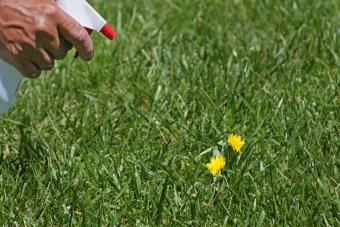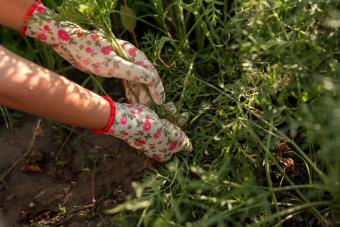
The easiest recipe for vinegar weed killer is simply to use vinegar at full strength, without adding anything else. White vinegar is most often used for this purpose, although any vinegar will work. Vinegar is generally a pet-safe weed killer, as well.
Types of Vinegar
There are many types of vinegar. The most popular type is apple cider vinegar. It is usually a mixture of apple cider, vinegar and water reduced to five percent acidity for more uniform pickling and table strength. Pickling vinegars may go up to 18 percent acidity. Generally, the stronger the acidity level of a vinegar, the stronger the vinegar's weed killing power will be. It is the acetic acid in vinegar which works to kill undesirable plants.
Recipes for Vinegar Weed Killer
There are numerous recipes used by gardeners. It depends upon your own experience and opinion which is best to use. Several different recipes are given below, followed by warnings and other information which will be helpful to you.
- Vinegar alone - Full strength, undiluted 18 percent acidity vinegar can be an effective weed killer.
- Vinegar and Soap - Mix dishwashing soap at a rate of one ounce per gallon of full strength vinegar. This mixture can double as an insecticide. Be aware of this as you're using it. Also remember that it will kill your good plants as well, so be sure not to get it onto any of your flowers or vegetable plants. Please see the dangers section below for warnings about harmful chemicals in some detergents.
- Vinegar, Soap, and Salt - One gallon vinegar, one cup of salt, one tablespoon dishwashing liquid. Mix together and apply. Please see the dangers section below for warnings about harmful chemicals in some detergents.
- Vinegar and Lemon Juice - Many people say that adding lemon juice to vinegar increases its effectiveness as a weed killer. This is because it increases the acidity levels. Adding anywhere from one tablespoon to one cup per gallon is a common recipe.
- Vinegar and Essential Oil - Mix full strength vinegar with one tablespoon of essential oil of clove or orange. Some gardeners say the oil helps the mixture stick to the plants better to increase effectiveness.
Warnings and Dangers
Here are a few tips to keep in mind to avoid damaging lawn, soil, animals or plants:
- Be aware that any recipe for vinegar weed killer has the power to kill weeds and undesirable plants, but that it does not discriminate in what it kills. It also has the power to kill good and desirable plants. For that reason, be sure not to spray it on or near plants you wish to keep such as ornamental plants or your vegetable garden.
- Vinegar is often used as a disinfectant to kill bacteria, mold and germs. That is fine when you want those things gone from your home or your kitchen counter top, but in the environment, there are many beneficial bacteria which you want to keep in your soil. Rich compost and humus is teeming with beneficial bacteria and organisms. Avoid spraying any of these solutions on soil where you intend to plant because it will sterilize the soil - perhaps up to two years.
- Be selective of the type of detergent/soap/liquid you add to your homemade weed killer. There are certain dangers associated with chemicals that are commonly found in household cleaning solutions, such as laundry detergent. These include phosphates, phenols and sodium hypochlorite or bleach. According to the National Institutes of Health, phosphates damage the environment; phenols and sodium hypochlorite have toxic properties. Choose detergents that are free of these chemicals. Also avoid any household cleaners that are "antibacterial" as these will kill beneficial bacteria in the soil.
Other Uses
Vinegar is eco-friendly and organic. It may be used for a variety of purposes, such as:
- Weed Killer
- Insecticide
- Fungicide
- Disinfectant
- Table condiment
- Pickling medium
How to Apply
Add your vinegar or weed killer mixture to a spray bottle or put it in a watering can. The best results are achieved when you apply the vinegar or solution directly to the plants you want to kill, including the leaves, trunk, flowers and stems, rather than applying at the root/soil level.







